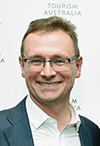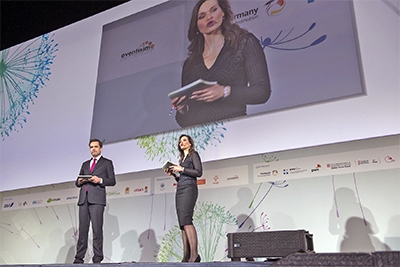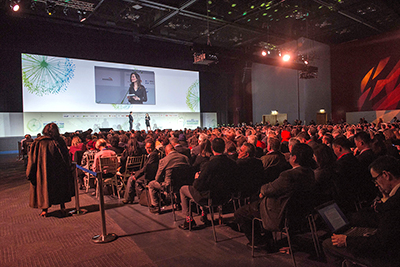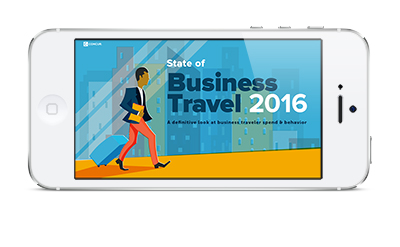INTERNATIONAL Convention Centre Sydney (ICC Sydney) staged its first international business event in January, catering for more than 8,000 international delegates in the showcase of the venue’s capability.
ICC showed its versatility in meeting the needs of incentive event the Amway China Leadership Seminar 2017, over a 13-day period.
Over 13 days, organisers utilised a range of ICC Sydney’s flexible spaces, including the extraordinary 2,500 capacity Darling Harbour Theatre, as well as the Convention Centre’s five star meeting rooms for breakout sessions. 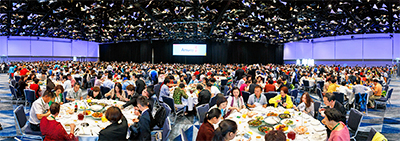
ICC Sydney CEO, Geoff Donaghy, said the Amway China Leadership Seminar 2017 was “a huge success for the world class venue” with client feedback praising ICC Sydney’s layout, capabilities and expert counsel.
“It’s showtime at ICC Sydney and Amway China has helped us kick off the year with style and substance,” Mr Donaghy said.
“We have had great feedback from the organisers who were thrilled with our ability to support a range of event types within the overall program. For instance, Darling Harbour Theatre, which is also a performance space, became the perfect setting for large-scale presentations, while our Grand Ballroom – within the Convention Centre itself – provided the ideal location for each 2,000-person banquet.
“We are delivering a paradigm shift in the way that business events are run by providing the ultimate in quality, choice and flexibility for the world’s leaders and thinkers to meet, collaborate and innovate.
“With 500 bookings already secured, it’s clear that our industry leading proposition is making an impact,” Mr Donaghy said.
He said according to post-event surveys, delegates loved the gourmet Chinese sharing banquet provided, which was designed in line with ICC Sydney’s industry-first Feeding Your Performance philosophy. Dishes featured fresh, seasonal and locally sourced ingredients, expertly combined to drive physical and mental performance. Guests were also impressed with the courtesy and efficiency of staff, and their friendly manner, which put first-time visitors at ease.
Associate director of AV and events production for Amway China, Bert Li, said ICC Sydney’s staff and facilities delivered on expectations across the board.
“Every event comes with its own opportunities and complexities,” Mr Li said. “From developing specific bi-lingual signage and providing exclusive routes through the precinct, to creating dishes that mirrored our guests’ tastes, every detail was anticipated and delivered to a five star standard.
“I’m pleased to say that the Amway China Leadership Seminar 2017 was a triumph thanks to a trifecta of best in class facilities, flexible spaces and most importantly, an expert team that was easy to deal with and quickly addressed our every need.”
The event, which saw delegates arrive in four groups, also took advantage of many of Sydney’s key attractions and hotels including Luna Park, Sydney BridgeClimb, Sheraton on the Park, The Star, Sydney Tower Restaurant, Captain Cook Cruises, and Sydney Opera House.
Organisers cited the precinct’s stellar audio visual equipment as essential to delivering ‘next-level’ presentations, and its remarkable 10Gbps optical fibre backbone and precinct-wide connectivity, in supporting a seamless experience.
The event also offered VIP visitors the chance to explore the broader precinct, with The Hunger Games: The Exhibition and Brickman Wonders of the World Exhibition, both concurrently held in the venue’s exhibition halls.
Business Events Sydney CEO, Lyn Lewis-Smith, whose company that secured the event for Sydney, said the precinct underpins Sydney’s reputation as one of the world’s most desirable business meeting destinations.
“As the centrepiece of the AU$3.4 billion, 20-hectare transformation of Darling Harbour, ICC Sydney has generated huge interest from international organisations and played a significant role in Amway China’s decision to return to Sydney for a third time,” Ms Lewis-Smith said.
“In the past decade we have seen 20 percent year-on-year growth from the highly lucrative Asian incentive market. ICC Sydney will drive this further, and deliver major cultural and economic benefits.”
Officially launched in December 2016, ICC Sydney is expected to inject an estimated $5 billion in to the NSW economy over the next 25 years.
www.iccsydney.com
ends
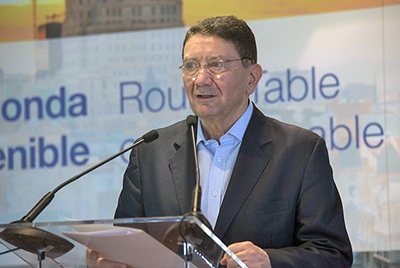

 How to resolve AdBlock issue?
How to resolve AdBlock issue? 